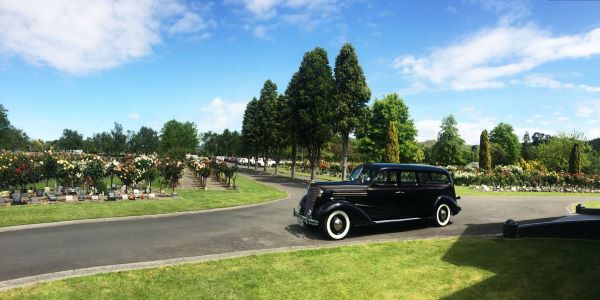
A Guide to Funeral Transport
The final journey can be an emotional and poignant part of the service. Most funeral processions are led by a vehicle called a hearse, which traditionally carries the deceased in their coffin.
However, the term 'hearse' can describe a multitude of different vehicles. Families often want to personalise this important procession by selecting a vehicle to reflect the life and passions of their loved one.
Here we have laid out the different options available as funeral transport, as well as some key things to consider when deciding on your transportation.
What Funeral Transport Do I Need?
A funeral procession usually consists of the hearse, carrying the coffin, followed by one or more limousines, containing close family. To travel with family and friends in an accompanying limousine can be very comforting. You need to decide who will be travelling in the official cortège.
However, none of this is obligatory. While you may want to make traditional transport arrangements, if you are concerned about money you could book only a hearse and encourage guests to make their own way to the service. You might not even want to use a hearse, as it is absolutely possible to use your own car to transport a body to the funeral - it's entirely up to you.
What is a Hearse?
A hearse is essentially any vehicle with a long chassis that is adapted to accommodate a coffin behind the driver seats. A carefully secured coffin can be transported to a funeral in an ordinary van or estate car, but most people choose for some form of hearse to lead the funeral procession or cortege.
Funeral directors typically collect the body of the deceased in a first call vehicle – a specially modified van with tinted windows so that passers-by cannot see in. The hearse is reserved for the funeral procession.
Most modern hearses in use today are black motorcars. A number of well-known car manufacturers make hearses and funeral limousines, including Rolls Royce, Daimler, Mercedes, Jaguar, Volvo, Vauxhall, Ford and Maserati.
Horse-drawn Hearses
Horse-drawn carriage hearse are the more traditional form of funeral transport which still remains popular today. In the 19th century a specific style of hearse emerged: mahogany carriages with intricate carvings and black velvet drapes. There are a number of livery stables around the UK that specialise in providing funeral coaches and the horses that pull them.
Other Alternative Hearses
As funerals have become more personalised, alternative funeral transport has become increasingly common. If a vehicle has a chassis that’s long and wide enough it can probably be modified to carry a coffin. So no matter the type of vehicle, it’s still a hearse!
For a variety of personal reasons, many people decide to transport their loved one to the funeral service in something other than the traditional hearse. In many ways, the choice of vehicle can be regarded as a kind of tribute, particularly if they were a car or motorbike enthusiast.
Among the most popular alternative options provided by funeral homes and specialist carriage masters is the motorcycle hearse, with a glass-sided sidecar conveying the coffin. Harley Davidson hearses, along with Triumphs and Thunderbirds, are especially popular for biker funerals.
VW campers, motor trikes, hot-rods, Land Rover, JCBs, vintage flatbed trucks and even taxis are among the variety of alternative ways that someone can travel to their own funeral in style. Hearses need not be black and it’s possible to request cars or horse-drawn carriages in a variety of eye catching liveries, from leopard print and flower-power patterns to Union Flag designs. You may also wish to forego the traditional limousine and hire a Routemaster bus to transport all of the funeral attendees.
How Much Does Funeral Transport Cost?
On average, people tend to spend around £150-£250 on a hearse to transport the coffin and a further £150 per vehicle on cars for the main funeral party. However, there are numerous types of vehicle and hearse to choose from, so prices can vary enormously. Extra funeral cars for mourners can cost at least £250, with the cost of a horse-drawn hearse often exceeding £1000.
Further Key Considerations
When organising the funeral transport, there are certain things to keep in mind to guide your decision making. We have set these out below:
- The Funeral Cortege Route: You may want the hearse and following cars to take a special route to the funeral, passing a favourite place or view.
- Mobility: Will you require wheelchairs for elderly or disabled mourners?
- Floral Hearse: Will an additional hearse be required to carry the flowers?
- After the Funeral: Where will you return to after the funeral? Will you require transport to the wake or funeral reception?
Find out about the different types of funerals you can hold for your loved one.